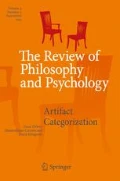Abstract
Experimental philosophers have recently questioned the use of intuitions as evidence in philosophical methods. Kuntz and Kuntz (Review of Philosophy and Psychology 4:643–665, 2011) conduct an experiment suggesting that these critiques fail to be properly motivated because they fail to capture philosophers’ preferred conceptions of intuition-use. In this response, it is argued that while there are a series of worries about the design of this study, the data generated by Kuntz and Kuntz support, rather than undermine, the motivation for the experimentalist critiques of intuition they aim to criticize.
Similar content being viewed by others
Notes
Nor is it entirely clear from the discussion in K&K why one could not use IDR to discover—as well as to test or justify—certain kinds of epistemic norms.
Furthermore, if intuitions are used predominately in discovery roles not impugned by variation between or among persons, then this may question the relevance of the large body of work in experimental philosophy testing the reliability of intuitions to philosophical methodology.
Instances of the phrase “experimentalist critiques” throughout refer to the two particular accounts presented in Section 1. However it is not accurate to lump all critiques of intuition use presented by experimental philosophers into a single category, since evaluating these arguments critically depends on the various uses of intuitions they target. For example, an experimental critique of intuitions used in conceptual analysis may work very differently than a critique of intuitions used in metaphysical or normative projects.
It might be thought that this criticism also cuts against experimentalist critiques of intuition use, if those critiques are also based solely on philosophers’ conceptions of intuition use. Many thanks to an anonymous reviewer for this point.
K&K do find differences in agreement by subspecialty, which may suggest that answers do reflect accounts of intuition-use within certain areas of philosophy, and not the field as a whole.
Note that these proportions, like those presented in the original article, were calculated by taking the means above and below the midpoint on Likert scales measuring agreement, and do not reflect binary participant judgments concerning agreement.
But of course, nowhere in Weinberg et al. (2001) or Weinberg (2007) is it claimed that intuitions are used as justification tout court in philosophy. So there is nothing ambiguous about motivating IDR or PAI based on agreement with both justificatory and discovery roles of intuition. In fact, K&K’s results regarding support for different conceptions of intuition use may end up supporting the wide array of projects in experimental philosophy targeting the different ways intuitions are used across various arguments and sub-disciplines.
References
Bedke, M. 2008. Ethical intuitions: What they are, what they are not, and how they justify. American Philosophical Quarterly 45: 253–270.
Buckwalter, W. and Stich, S. 2012. Gender and philosophical intuition. Forthcoming in Joshua Knobe & Shaun Nichols (eds.), Experimental Philosophy Vol. 2. Oxford University Press.
Descartes, R. 1964. Philosophical essays: Discourse on method; meditations; rules for the direction of the mind. (L.J. Lafleur, trans). Kansas City: Bobbs Merrill.
Goldman, A. 2007. Philosophical intuitions: Their target, their source, and their epistemic status. Grazier Philosophische Studien 74: 1–26.
Gopnik, A., and E. Schwitzgebel. 1998. Whose concepts are they, anyway? The role of philosophical intuition in empirical psychology. In Rethinking intuition, ed. W. Ramsey and M. DePaul, 75–91. Lanham: Rowman & Littlefield.
Kuntz, J.R., and J.R.C. Kuntz. 2011. Surveying philosophers about philosophical intuition. Review of Philosophy and Psychology 4: 643–665.
Machery, E. 2011. Thought experiments and philosophical knowledge. Metaphilosophy 42(3): 191–214.
Machery, E., R. Mallon, S. Nichols, and S. Stich. 2004. Semantics, cross-cultural style. Cognition 92: B1–B12.
Roskies, A., and S. Nichols. 2008. Bringing moral responsibility down to earth. Journal of Philosophy 105: 371–388.
Schwitzgebel, E. 2009. Do ethicists steal more books? Philosophical Psychology 22: 711–725.
Schwitzgebel, E., and J. Rust. 2009. The moral behaviour of ethicists: Peer opinion. Mind 118: 1053–1059.
Schwitzgebel, E., Rust, J., Huang, L. T., Moore, A. T., and Coates, J. 2012. Ethicists’ courtesy at philosophical conferences. Forthcoming in Philosophical Psychology.
Skelton, A. 2007. Critical notice of Robert Audi, the good in the right. Canadian Journal of Philosophy 37: 305–326.
Sosa, E. 1998. Minimal intuition. In Rethinking intuition, ed. W. Ramsey and M. DePaul, 257–269. Lanham: Rowman & Littlefield.
Swain, S., J. Alexander, and J. Weinberg. 2008. The instability of philosophical intuitions: Running hot and cold on Truetemp. Philosophy and Phenomenological Research 76: 138–155.
Tobia, K., W. Buckwalter, and S. Stich. 2012. Moral intuitions: Are philosophers experts? Philosophical Psychology. doi:10.1080/09515089.2012.696327.
Weinberg, J. 2007. How to challenge intuitions empirically without risking skepticism. Midwest Studies in Philosophy 31: 318–343.
Weinberg, J., S. Nichols, and S. Stich. 2001. Normativity and epistemic intuitions. Philosophical Topics 29: 429–460.
Author information
Authors and Affiliations
Corresponding author
Rights and permissions
About this article
Cite this article
Buckwalter, W. Surveying Philosophers: a Response to Kuntz & Kuntz. Rev.Phil.Psych. 3, 515–524 (2012). https://doi.org/10.1007/s13164-012-0103-6
Published:
Issue Date:
DOI: https://doi.org/10.1007/s13164-012-0103-6



